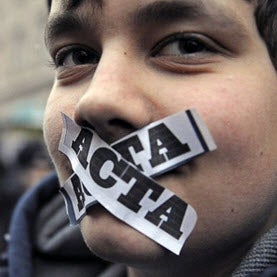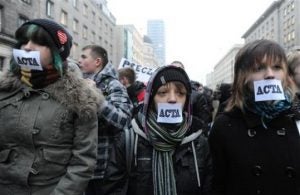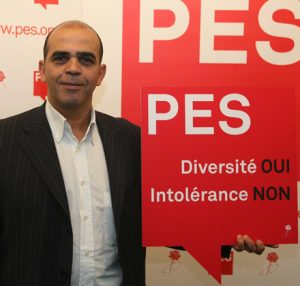Big Brother: How ACTA Brings SOPA’s Threat to a Global Scale

Furthermore ACTA requires ISPs to snoop on all user data (much like an airport scanner) in case there is something illegal, strengthens enforcement laws eliminating unintentional offence (such as uploaded videos featuring copyrighted music or pictures with company logos or products in them) and does away with safe habor [sic] laws, allowing sites to be taken down on the suspicion of improper use of copyright by its users. Even more concerning is ACTA does not define ‘Intellectual Property’ (which opens the legal floodgates to the likes of cheaper third party medicines) and it allows media rights holders to set their own fines.

Of course this all sounds draconian, so where are the protests? In part they have been subdued by the lack of transparency, but discontent is building. Thousands took to the streets in Poland after Prime Minister Donald Tusk’s government signed ACTA this week and in an unprecedented move, French European Parliament member Kader Arif [pictured below], who was assigned to monitor ACTA proceedings, resigned in protest as France added its name to the signatories.
“I want to denounce in the strongest possible terms the process that led to the signing of this agreement,” said Arif on his website. “No association of civil society, lack of transparency from the beginning of negotiations, successive postponements of the signing of the text without any explanation being given, setting aside the claims of the European Parliament… This agreement might have major consequences on citizens’ lives, and still, everything is being done to prevent the European Parliament from having its say in this matter. That is why today, as I release this report for which I was in charge, I want to send a strong signal and alert the public opinion about this unacceptable situation. I will not take part in this masquerade.”

Arif added that he had “faced unprecedented manoeuvres from the Right [wing] of the Parliament to impose an accelerated schedule to pass the agreement as soon as possible before the public is alerted”. Attempts to fast track ACTA are well known. Despite its secrecy, the original schedule was to have it tabled at the G8 summit and completed by the end of 2008.
All of which leaves sides arguing in circles: the right of intellectual property holders to defend their work verses the claims of censorship to sustain these holder’s outdated business models. Both sides have merit, but the fundamental difference is rights holders are well organised through bodies such as the MPAA and RIAA while their more widespread opponents are vocal, but disorganised often expressing radical views and fatuous truisms (“we shall not be silenced” etc). So what is the solution?


